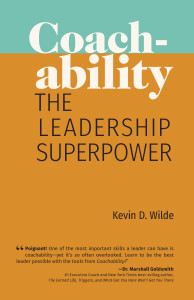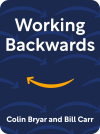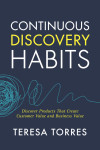Coachability
The Leadership Superpower
Why do so many talented leaders plateau in their careers? The answer often lies in a decline in coachability—the ability to receive and act on feedback. As leaders ascend the corporate ladder, they may become increasingly resistant to criticism, believing they have all the answers.
Coachability challenges this notion, exploring the common pitfalls that hinder leadership development. Through the lens of the SRRA framework—Seek, Respond, Reflect, and Act—the book empowers readers to:
- Break free from limiting beliefs: By recognizing and dismantling self-limiting beliefs like the "False Finish Line" and the "Super Human Stance," leaders can cultivate a growth mindset.
- Build stronger relationships: Fostering open communication and trust with mentors, coaches, and peers is essential for continuous learning and development.
- Enhance leadership skills: By actively seeking feedback and reflecting on their performance, leaders can identify areas for improvement and develop the skills needed to thrive.
- Achieve long-term success: By embracing coachability, leaders can position themselves for career advancement, organizational impact, and lasting success.
With practical strategies and actionable exercises, Coachability provides a roadmap for leaders to unlock their full potential and maintain a high level of coachability throughout their careers.
By mastering these skills, you'll unlock your leadership potential and achieve lasting success.
By reading "Coachability," you will:
- Master the SRRA Framework: Learn to systematically seek feedback, respond openly, reflect deeply, and act decisively to improve your leadership effectiveness.
- Overcome Coachability Barriers: Identify and address the five faulty assumptions that limit leadership growth, such as the "False Finish Line" and the "Super Human Stance."
- Develop Practical Feedback Habits: Create sustainable practices for continuous improvement through specific techniques like the military after-action review and STAR framework.
- Build Reflection Systems: Implement daily, weekly, and monthly reflection practices that drive real behavioral change.
Books to Follow:
- "Thanks for the Feedback" by Douglas Stone & Sheila Heen: Provides a comprehensive framework for understanding and processing feedback effectively. Where "Coachability" introduces the SRRA framework, Stone and Heen dive deep into the neuroscience and psychology of feedback reception. Their three-part model (appreciation, coaching, and evaluation) directly enhances the "Respond" component of SRRA, offering specific techniques for managing defensive reactions and extracting value from even difficult feedback conversations.
- "The Checklist Manifesto" by Atul Gawande: Explores how to build robust systems that ensure consistent execution and improvement. While "Coachability" establishes frameworks like the Military After Action Review, Gawande shows how to transform these into reliable, repeatable processes. His insights are particularly valuable for implementing the "Act" component of SRRA, helping leaders move from reflection to systematic action.
- "Rules for Radicals" by Saul Alinsky: Examines how to create and sustain meaningful change within complex systems. The book's principles on power dynamics and systematic change complement "Coachability"'s frameworks for personal transformation, offering valuable insights into how leaders can maintain growth mindsets within organizational constraints.
- "Be the Boss Everyone Wants to Work For" by William Gentry: Explores the practical application of leadership development principles in day-to-day management situations. The book provides concrete strategies for translating improved coachability into better team leadership, showing how personal growth directly impacts team performance and organizational culture.
The SRRA Framework
The SRRA framework is a systematic approach to improving coachability:
- Seek: Actively seek feedback and opportunities for improvement.
- Respond: Receive feedback openly and non-defensively.
- Reflect: Deeply consider the feedback and its implications.
- Act: Take concrete steps to implement the feedback.
The Decline Pattern
As leaders advance, they often fall into common traps that hinder their coachability:
- False Finish Line: Believing past successes are enough for future challenges.
- Super Human Stance: Thinking they are infallible and above criticism.
- Boss Busting Bubble: Isolating themselves and avoiding honest feedback.
- Lonely Leader Lament: Feeling alone and unsupported.
- Magic Moment Mirage: Waiting for a perfect opportunity to change.
Systematic Reflection
To cultivate a culture of continuous learning, leaders should implement a structured reflection practice:
- Daily Reflection: Spend 5 minutes each day reviewing the day’s events and identifying key lessons.
- Weekly Reflection: Dedicate 15 minutes each week to reflecting on highlights, lowlights, and areas for improvement.
- Monthly/Quarterly Reflection: Set aside an hour to review goals, assess progress, and make adjustments.
Feedback Processing
When receiving feedback, leaders should make a conscious decision about how to respond:
Dismiss: If the feedback is inaccurate or unhelpful, politely decline it.
Act: If the feedback is valid and actionable, create a plan to implement it.
Ponder: If the feedback is thought-provoking but requires further consideration, schedule a follow-up.
The Change Framework
To successfully implement change, leaders must:
- Self-Awareness: Accurately assess their strengths and weaknesses.
- Motivation: Cultivate a strong desire to change.
- Tools and Strategies: Utilize effective tools and techniques to support their efforts.
- Sustainability: Develop habits and routines to maintain their progress.
Q: How can you tell if you’ve become less coachable?
A: Key indicators include: decreased active seeking of feedback, defensive responses to input, lack of regular reflection practices, and believing your current skills are sufficient for your role.
Q: What makes the SRRA framework effective?
A: It breaks down coachability into actionable components that can be practiced and measured. Rather than treating coachability as a personality trait, it provides specific behaviors to develop. The SRRA framework stands for Seek, Receive, Reflect, and Act.
Q: How do you balance being coachable with being confident as a leader?
A: The book emphasizes that true confidence comes from being secure enough to acknowledge areas for growth. Coachable leaders maintain confidence while remaining curious and open to learning. Coachability can actually enhance leadership confidence by demonstrating a commitment to continuous improvement and a willingness to learn from others.
Q: What’s the most effective way to start improving coachability?
A: Start with implementing the daily 5-minute reflection practice and actively seek feedback on one specific aspect of your leadership. This creates momentum while being manageable.
Q: How do you handle feedback that seems wrong or misguided?
A: The book recommends using the “Three Decisions” framework: Dismiss (with explanation), Act, or Ponder. Even if ultimately dismissed, feedback should be reflected upon and the feedback giver should receive a thoughtful response.
- Transitioning to a Senior Role: Avoid the common pitfall of relying on past successes and embrace the need for continuous learning and adaptation.
- Feeling Stuck in Leadership Development: Break through plateaus and unlock new growth opportunities by developing a coachable mindset.
- Building a Feedback Culture: Model coachability for your team and create a psychologically safe environment where honest feedback can thrive.
- Struggling with Receiving Feedback: Overcome defensive reactions and maximize the value of feedback by implementing practical strategies.

Your support helps me maintain and improve the book recommendations for everyone.



